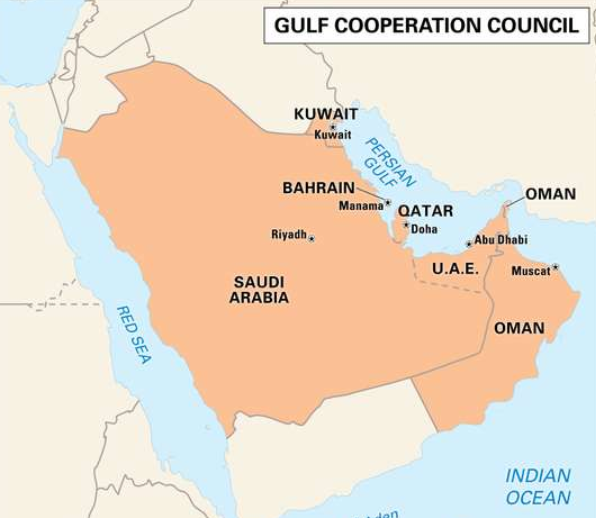International Relations
Solidarity and Stability Deal: Gulf Countries
- 06 Jan 2021
- 6 min read
Why in News
Recently, Gulf states signed a ‘solidarity and stability’ deal at the 41st Gulf Cooperation Council (GCC) summit held in Al Ula, Saudi Arabia.
Key Points
- Background:
- Sanctions on Qatar:
- In June 2017, Saudi Arabia and its allies, the United Arab Emirates (UAE), Bahrain and Egypt severed ties with Qatar and imposed a naval, air and land blockade on the country.
- Reasons:
- Qatar was charged to be too close to Iran and backed radical Islamist groups.
- The country was alleged to support and fund terror through its support of Iran and Muslim Brotherhood (a Sunni Islamist political group outlawed by both Saudi Arabia and the UAE).
- Sanctions on Qatar:
- Solidarity and Stability Deal:
- Members of the GCC signed a deal in AlUla, Saudi Arabia to remove all the sanctions over Qatar and re-open their land, sea and air borders to Qatar.
- Bahrain, Kuwait, Oman, Qatar, Saudi Arabia and UAE are the members of GCC.
- Reason:
- To unite efforts to promote the Gulf region and to confront challenges that surround them, especially the threats posed by the Iranian regime’s nuclear and ballistic missile programme and its plans for sabotage and destruction.
- Members of the GCC signed a deal in AlUla, Saudi Arabia to remove all the sanctions over Qatar and re-open their land, sea and air borders to Qatar.
Gulf Cooperation Council
- GCC is a political, economic, social, and regional organisation which was established by an agreement concluded in 1981 among Bahrain, Kuwait, Oman, Qatar, Saudi Arabia and UAE in view of their special relations, geographic proximity, similar political systems based on Islamic beliefs, joint destiny and common objectives.
- The structure of the GCC consists of the Supreme Council (the highest authority), the Ministerial Council and the Secretariat General. The Secretariat is located in Riyadh, Saudi Arabia.
India’s Relation with Gulf Region
- India and GCC:
- The economic and political relationship of India with the GCC has improved in recent years.
- The friendly relation has been reflected in the bilateral trade of around USD 121 billion and remittances of USD 49 billion from a workforce of over nine million.
- GCC suppliers account for around 34% of India’s crude imports.
- India and Iran:
- India has always shared a friendly relationship with Iran. But the India-Iran relation faces one of the most complex phases at all times due to the USA’s pressure which has politico-economic impacts.
- In May 2018, the USA abandoned the nuclear deal (Joint Comprehensive Plan of Action) and reinstated economic sanctions against Iran.
- India and Qatar:
- Recently, India’s External Affairs Minister met the top leaders of Qatar and discussed strengthening the economic and security cooperation between the two countries.
- India shares a friendly relation with Qatar and even at the time of sanctions on Qatar, India maintained a cordial relation with the oil rich nation.
- India's Overall Role in the Region:
- India has avoided involvement in local or regional disputes in the region, since Indian interests do not entail power projection but necessitate peace and regional stability.
- The Gulf is among India’s top trading partners. The deepening energy interdependence is marked by growing volumes of energy imports into India. There is also the prospect of substantive investments from the Gulf into the Indian hydrocarbon sector.
- The number of Indian migrant workers in the region stands at more than 7 million.
- The expansion of the political engagement has been matched by the growing security cooperation, especially on counter-terrorism.
- India and its Gulf partners are also taking tentative steps towards defence cooperation.
- For example participation of Saudi Arabia, Oman, Kuwait, and others in India’s mega multilateral Milan Exercise.
Way Forward
- The Gulf region has historical, political, economic, strategic and cultural significance for India. India-GCC Free Trade Agreement (FTA) can provide a boost to the relations.
- It has been assessed that Saudi Arabia is a fading power whereas UAE, Qatar and Iran are emerging as the new regional leaders. Oman and Iraq will have to struggle to retain their sovereign identities.
- Thus, Indian interests would be best served if the stability in the region is ensured through cooperative security since the alternative, of competitive security options, cannot ensure durable peace.





